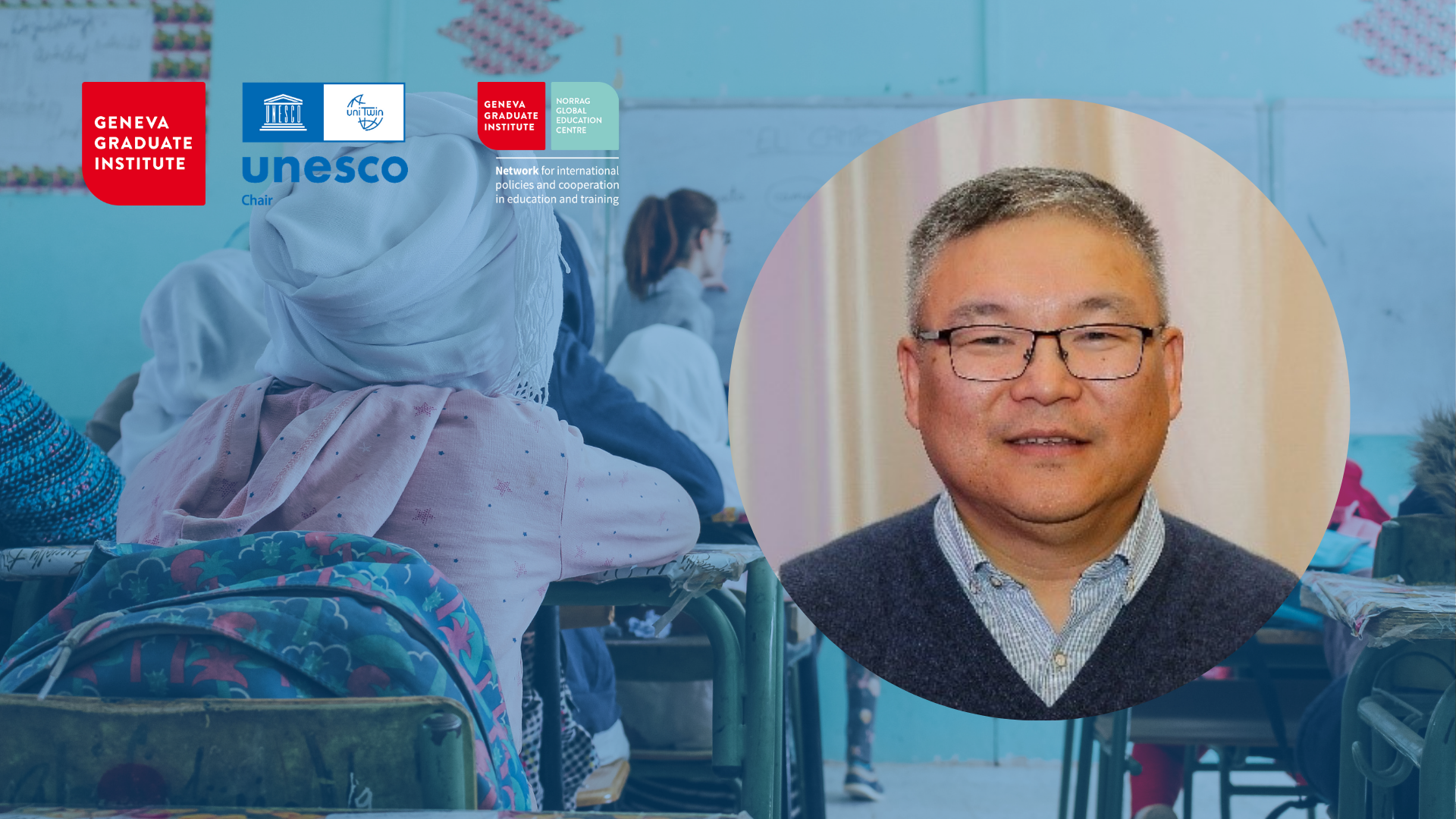Event Highlights - UNESCO Chair Series in Comparative Education Policy with Batjargal Batkhuyag: ‘How NGOs can keep the balance between their independence and their reliance on funding’
Lecture with Batjargal Batkhuyag
Date: Monday 11 November 2024
Time: 12.30pm to 2pm CET
Location: S5, Maison de la Paix & Online (Zoom)
Interpretation in Arabic, Mongolian and Russian will be available for online participants
Open Café with Batjargal Batkhuyag
Date: Tuesday 12 November 2024
Time: 10am to 11am CET
Location: The Fab, Maison de la Paix
UNESCO Chair Series in Comparative Education Policy with Batjargal Batkhuyag: ‘How NGOs can keep the balance between their independence and their reliance on funding’
On November 11, 2024, the UNESCO Chair Series on Comparative Education Policy held its second session at the Geneva Graduate Institute. The event was co-organized by the UNESCO Chair in Comparative Education Policy and NORRAG, and was co-sponsored by the Global Governance Center, the Departments of International and Development Studies and International Relations and Political Science, as well as the KIX EMAP Hub. Prof. Chanwoong Baek, UNESCO Co-Chair in Comparative Education Policy and Academic Director of NORRAG, served as the chair for the event.
The session featured Mr. Batjargal Batkhuyag, Executive Director of the Mongolian Education Alliance (MEA), and focused on the pressing themes of the role of Non-Governmental Organizations (NGOs) in development and advancing educational equity, particularly for marginalized groups. Mr. Batkhuyag not only laid out the spectrum of NGOs as Think Tanks and Implementers but also encompassed their functions in research, policy analysis, advocacy, project evaluation and service delivery. He actively engaged both in-person and virtual audiences to explore educational inequalities and the interplay between local priorities and global development frameworks.
Starting with a brainstorming activity, followed by interactive polls and discussions, Mr. Batkhuyag demonstrated how NGOs balance donor agendas and autonomy amid funding constraints and local education realities, with an acute focus on underserved or overlooked areas. He then explored approaches to bridging the gap between financial independence and achieving high-impact outcomes. These approaches ranged from the inclusion of marginalized voices in decision making and project design to the diversification of funding sources. He particularly argued for redirecting funding toward public and domestic domains to enhance NGOs’ independent capacity for impactful, context-specific work.
One of the major takeaways was how productive and constructive collaboration and partnerships could serve as transformational catalysts for balancing local relevance with donor expectations. Drawing on his experience at the MEA, Mr. Batkhuyag emphasized the strategy of international networking for advocacy and policy influence, citing a local case of implementing a reading and writing program in partnership with the World Bank.
The session concluded with an engaging Q&A session, in which topics such as the viability of financial independence, sustainable funding, accountability in education, and the utility of international educational assessments were explored. At an Open Café session the next day, participants continued a rich exchange on education policy and NGO autonomy, specifically in the Mongolian context.
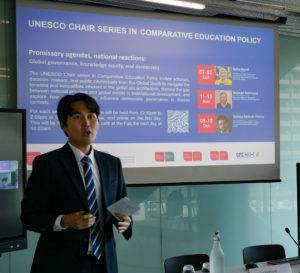
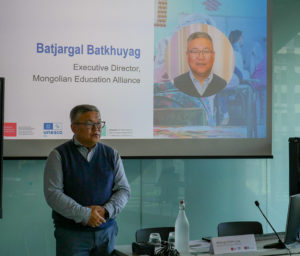
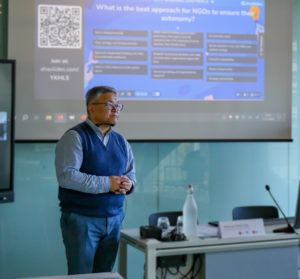
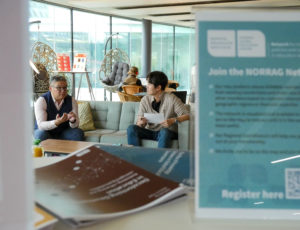
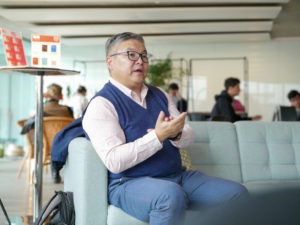
UNESCO Chair Series in Comparative Education Policy
With just a few years left to shape a new international education agenda, the UNESCO Chair series in Comparative Education Policy invites scholars, decision-makers, and public intellectuals from the Global South to share their analyses of the Sustainable Development Goals (SDGs) and broader international agendas. There is an emerging body of literature in political science, international relations, and comparative policy studies on the promissory legitimacy of global actors (Beckert, 2020; Berten & Kranke, 2022; Robertson & Beech, 2023). How do international and national actors navigate uncertain futures, shape national developments towards their pre-defined future, or correct wrong projections that have negatively impacted present policy decisions? Perhaps more than any other public sector, education is expected to prepare individuals for the future. Even international organizations have made it their project to specify that future in terms of 21st century skills (OECD) or human capital needed for economic productivity (World Bank), education ultimately suffers from a technology deficit. The deficit becomes glaring If we conceive of technology as a device that connects inputs with outcomes because educating subjects in the present (input) for a predefined, internationally agreed upon future (outcomes) is in and of itself counterintuitive. Therefore, education lends itself for reflecting on the promissory legitimacy of international organizations. These are only a few questions that this new area of research is able to address and thereby our understanding of tools of global governance.
This series, organized by the UNESCO Chair in Comparative Education Policy and NORRAG, will navigate the tensions and inequalities inherent in the global aid architecture and discuss the gap between national priorities and global scripts in international development.
 Batjargal Batkhuyag works as an executive director of the Mongolian Education Alliance (MEA), one of the leading NGOs in Mongolia dedicated to improving the quality of education for all children and promoting youth participation. He was previously Lecturer at Mongolia’s University of the Humanities working with student-teachers. His interests lie in promoting and advocating for access, equity and quality education with emphasis on the most marginalised groups. He’s joined a number of international and comparative research studies and initiatives. He’s contributed to 2017/18, 2019, 2020 and 2021 Global Education Monitoring Reports, co-authoring country background papers or compiling country profiles.
Batjargal Batkhuyag works as an executive director of the Mongolian Education Alliance (MEA), one of the leading NGOs in Mongolia dedicated to improving the quality of education for all children and promoting youth participation. He was previously Lecturer at Mongolia’s University of the Humanities working with student-teachers. His interests lie in promoting and advocating for access, equity and quality education with emphasis on the most marginalised groups. He’s joined a number of international and comparative research studies and initiatives. He’s contributed to 2017/18, 2019, 2020 and 2021 Global Education Monitoring Reports, co-authoring country background papers or compiling country profiles.
Co-host:
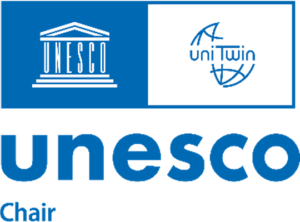
Co-sponsors:


